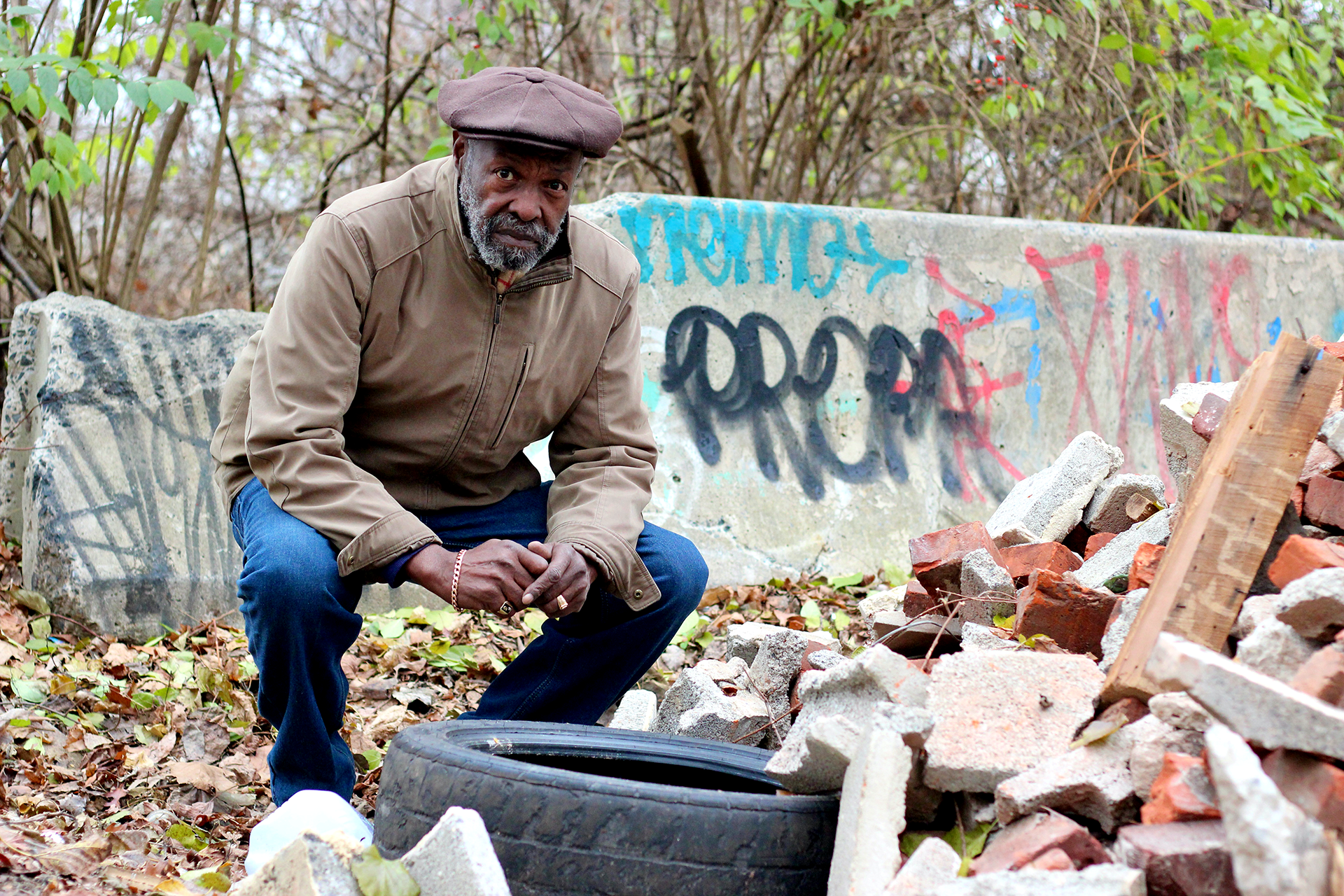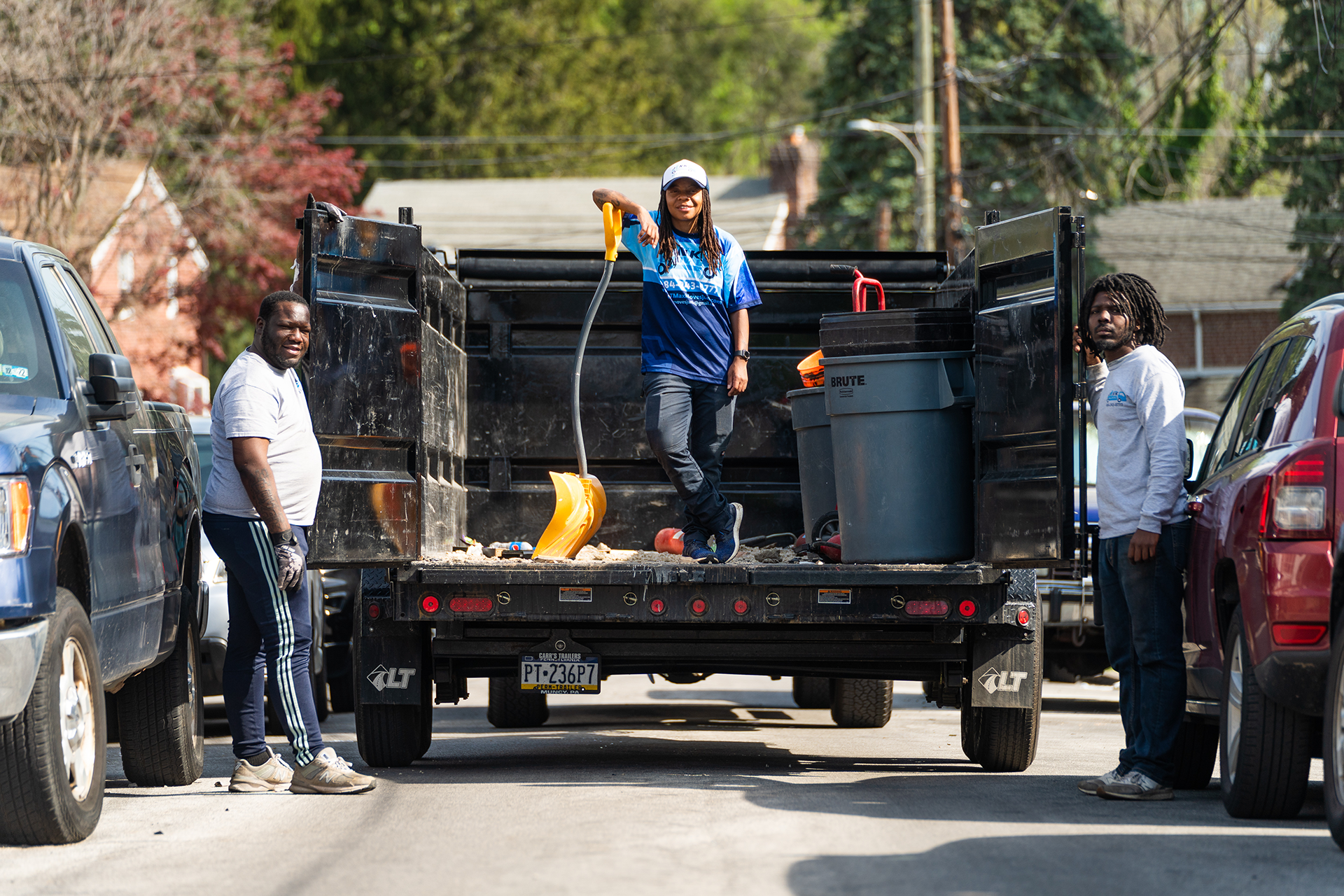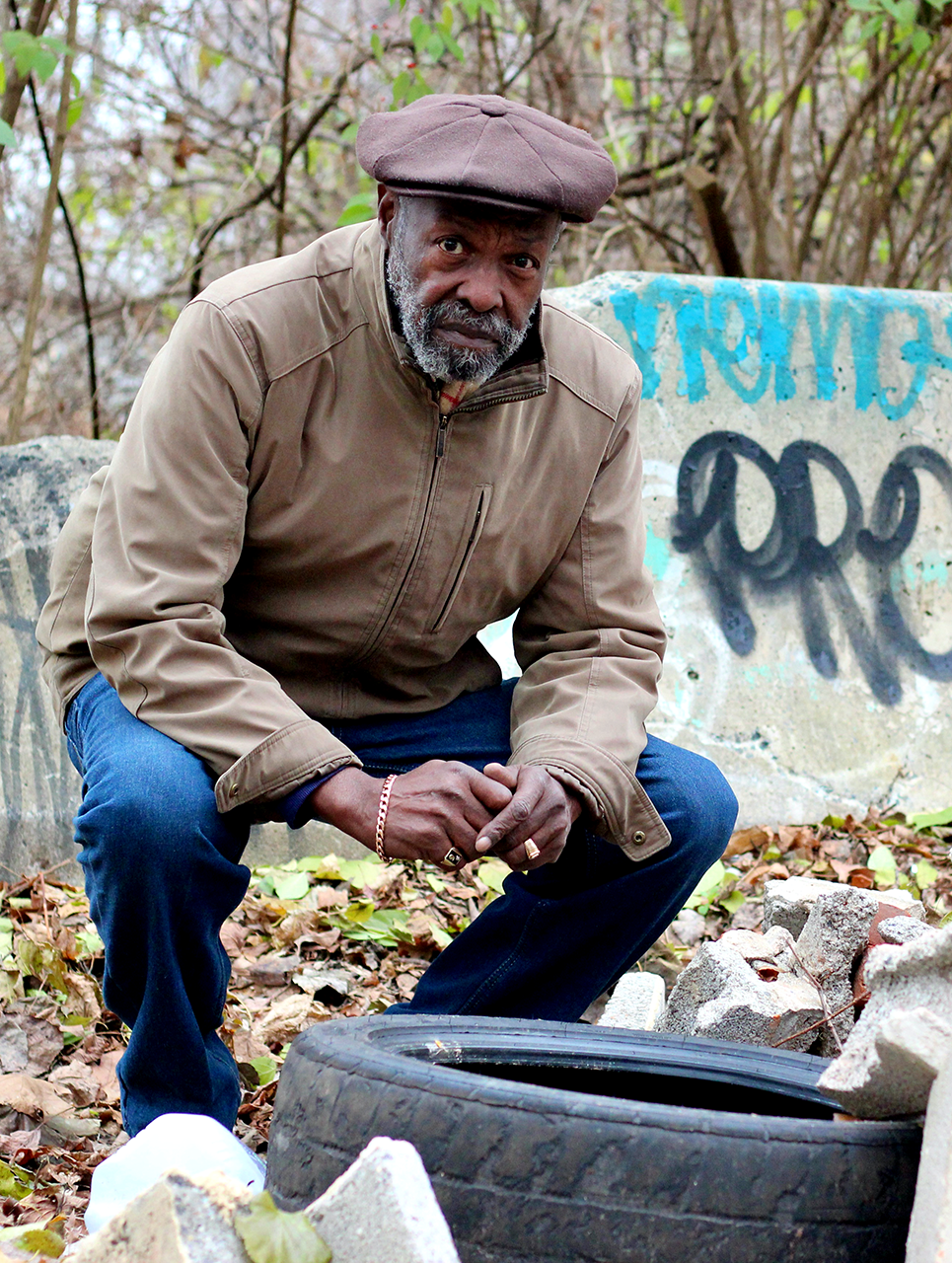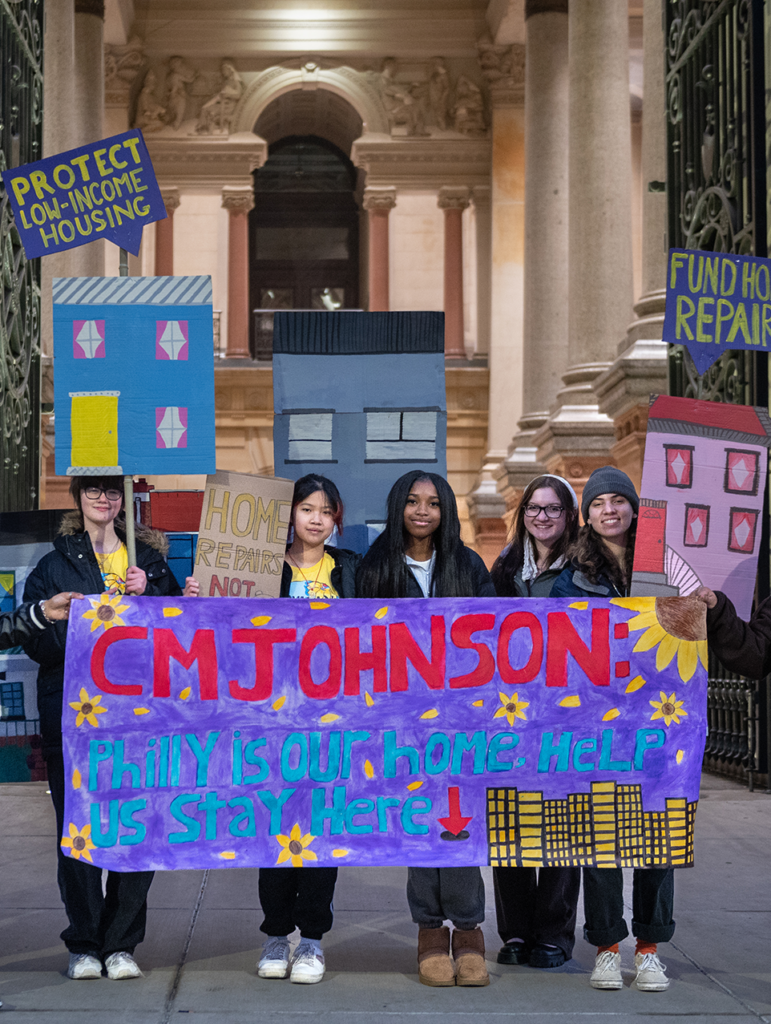On a drive through Tacony Creek Park in the spring of 2020, Lawncrest resident Dallas Herbert Sr. could barely get around illegally-dumped construction debris and tires. He was appalled. An executive board member of the Lawncrest Community Association, Herbert asked his older neighbors about this particularly trashed stretch called Snake Road; many informed him that they had been regularly cleaning the area for the last 25 years.
As a veteran, Herbert is no stranger to taking on challenging missions to make a difference. Through his work with the grassroots organization 215 People’s Alliance Northeast Chapter, he began spearheading the effort to clean up Snake Road for good, as covered in the January 2024 issue of Grid (#176).
Aminata Calhoun has been waging a similar battle against illegal dumping from her home in the Belmont neighborhood of West Philadelphia. Calhoun was featured on the cover of Grid’s September 2020 (#136) issue with the apt coverline “Belmont Beauty,” given Calhoun’s penchant for style as she beautifies her neighborhood. But sadly, Calhoun’s seemingly irrepressible energy can be subdued by illegal dumpers who leave piles of trash in already underserved communities.
The fact that this behavior continues to surface unchecked and not dealt with stringently by the City of Philadelphia systems leads to independent small haulers’ continuous contribution to environmental injustices.”
— Aminata Calhoun, Clean Philadelphia Now
“The magnitude of illegal dumping has brought me to the depth of environment distress,” Calhoun decries. “The fact that this behavior continues to surface unchecked and not dealt with stringently by the City of Philadelphia systems leads to independent small haulers’ continuous contribution to environmental injustices.”
But it doesn’t have to be this way; several organizations in Philly, including one that I co-direct, have come up with solutions the City could implement today to end illegal dumping in communities.
Calhoun and Herbert are both part of Clean Philadelphia Now, a grassroots campaign to end illegal dumping by 2028. This initiative is a consortium of organizations and activists across the city who are working to uplift the challenges and experiences of the many frontline community members who face the uphill battle of “legacy dumping.” Many members come from areas such as North Philly, Southwest Philly, Strawberry Mansion, Fairhill and West Kensington, which the 2019 Philadelphia Litter Index Report identified as some of the most dumped-on neighborhoods. According to Clean Philadelphia Now, “legacy dumping refers to locations identified by cleanup volunteers that experience persistent dumping despite repeated cleanup efforts, sometimes over a period of years.”
This behavior persists in part because, in Philadelphia, construction and demolition recycling facilities have what’s called a ton minimum, meaning that a hauler must pay for at least one ton of material, which could cost upwards of $130, even if they don’t have that much material to dispose of. As Calhoun explains: “Due to the claim of ‘inability to afford the cost of legal centers,’ independent small haulers have resolved to dumping waste in vacant lots, on street curbs, abandon homes, alleys and, at times, in a neighborhood driveway.”

Many Philly residents are beyond fed-up. “I do not accept that my Fairhill neighborhood is a free dumpsite for anyone’s trash,” says Teea Tynes, an activist with Clean Philadelphia Now. “Scheduled cleanup of illegal dumping is not sustainable and [is] morally offensive. I want a plan that ends dumping forever by 2028.”
It’s because of these voices that the organization I co-direct, Circular Philadelphia, has invested resources in finding sustainable solutions to illegal dumping. At Circular Philadelphia, we believe that longer term solutions like waste reduction and immediate cleanup of the city are two sides of the same issue. In 2023, our Built Environment Working Group created a policy that could do both: utilize the six City-operated sanitation convenience centers to accept small amounts of construction and demolition debris that are otherwise being illegally dumped.
You can take a deep dive on this policy by reading our “Expanding Access For Construction Debris Recycling: A Policy Guide” which can be found on the “policy & advocacy” section of circularphiladelphia.org.
But the gist is simple: We are asking for the City’s Department of Sanitation to secure a contract with a construction and demolition (C&D) recycler (of which we have many great choices in Philadelphia) to put a dumpster at each of the sanitation convenience centers and allow small haulers to drop off small loads no larger than a pickup truck of waste. We ran scenarios where the City could charge a $30 nominal fee for disposal or keep it completely free; in both cases it would cost less than the estimated $10 million the City is currently spending to clean up illegal dumping.
On the surface, it might seem that this plan caters to the businesses that are breaking the law and trashing our neighborhoods rather than cracking down with consequences. But many of us agree — whether it’s illegal dumping, drugs or other social ills — a City can’t arrest their way out of the problem. Instead, we can meet these haulers halfway in an effort to give them a better option, which could not only stop illegal dumping, but also further stimulate those in Philadelphia’s small hauler sector who are already doing the right thing to help grow their businesses.
As part of the Circular Philadelphia policy paper, we interviewed Taneesha Maxwell of T Maxwell Junk Removal and Cleanouts, an entrepreneur trying to make a living in the smaller scale hauling business the right,and legal, way. (Maxwell was also featured in a Grid May 2023 story, #168.) When asked about her support for this policy concept, she said, “This could actually allow me to offer better prices if these tipping fees are more reasonable. I could charge less if I was able to take a smaller load and not have to pay the ton minimum.”

But according to a source who requested to remain anonymous for fear of retribution, the City’s Office of Clean & Green director Carlton Williams has said to Clean Philadelphia Now members that this policy is unworkable because it could take years to secure a permit that would allow the City to accept this waste. I reached out to the City to give them a chance to explain the barriers to the policy, but they did not reply by the time this issue went to print.
Nevermind the fact that I think it’s totally worth it to invest a few years to address a problem that has plagued Philadelphia for decades — it actually won’t take as long as Williams says. In response to my query, a program manager at the Pennsylvania Department of Environmental Protection Norristown office explained: “The convenience centers operated by the Philadelphia Sanitation Department collect various types of material from residents and, at this time, are not required to have waste permits for various reasons for the different materials.” This person went on to explain that a new C&D material transfer station permit would require several steps under regulations, including public notice and meetings with the DEP. Once officially submitted, this type of application would go through a full review process in typically no more than 521 calendar days barring any unforeseen delays.
I have to admit, I was a little shocked to learn that there are no permit requirements for the current sanitation convenience centers. But even if they have to go the extra mile to get a permit to transfer C&D material, it would only take about a year and a half. This seems like not long to wait to address a problem that’s decades in the making.
Clean Philadelphia Now’s position is that the City needs “proactive policies, like convenience access to small haulers and increased enforcement,” to end dumping by 2028. And even though Herbert, of Lawncrest, is thankful for the work of the Clean & Green Office to attempt and clean up Philadelphia, he is realistic about the illegal dumping problem.
“Clean one day, dumped on the next,” Herbert says. “I would like to see the places that accept waste accept smaller loads at a lower price. I think that would be very helpful in the effort to stop illegal dumping.”









